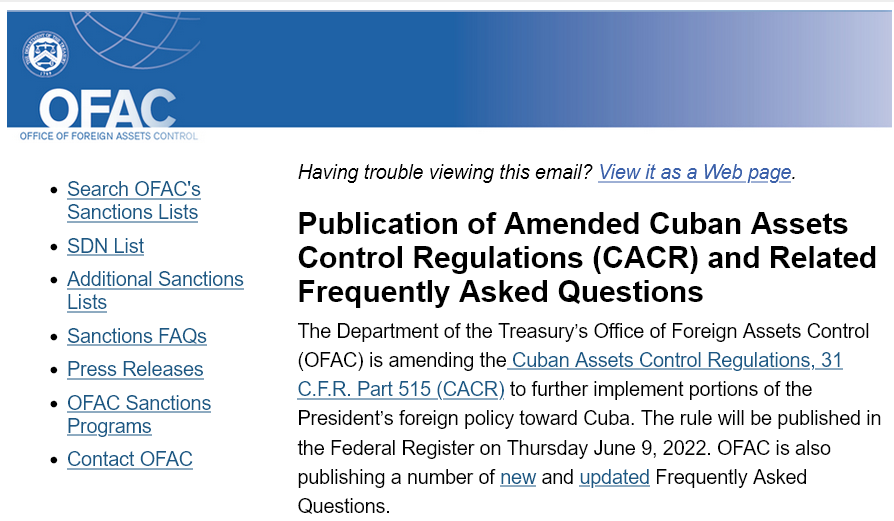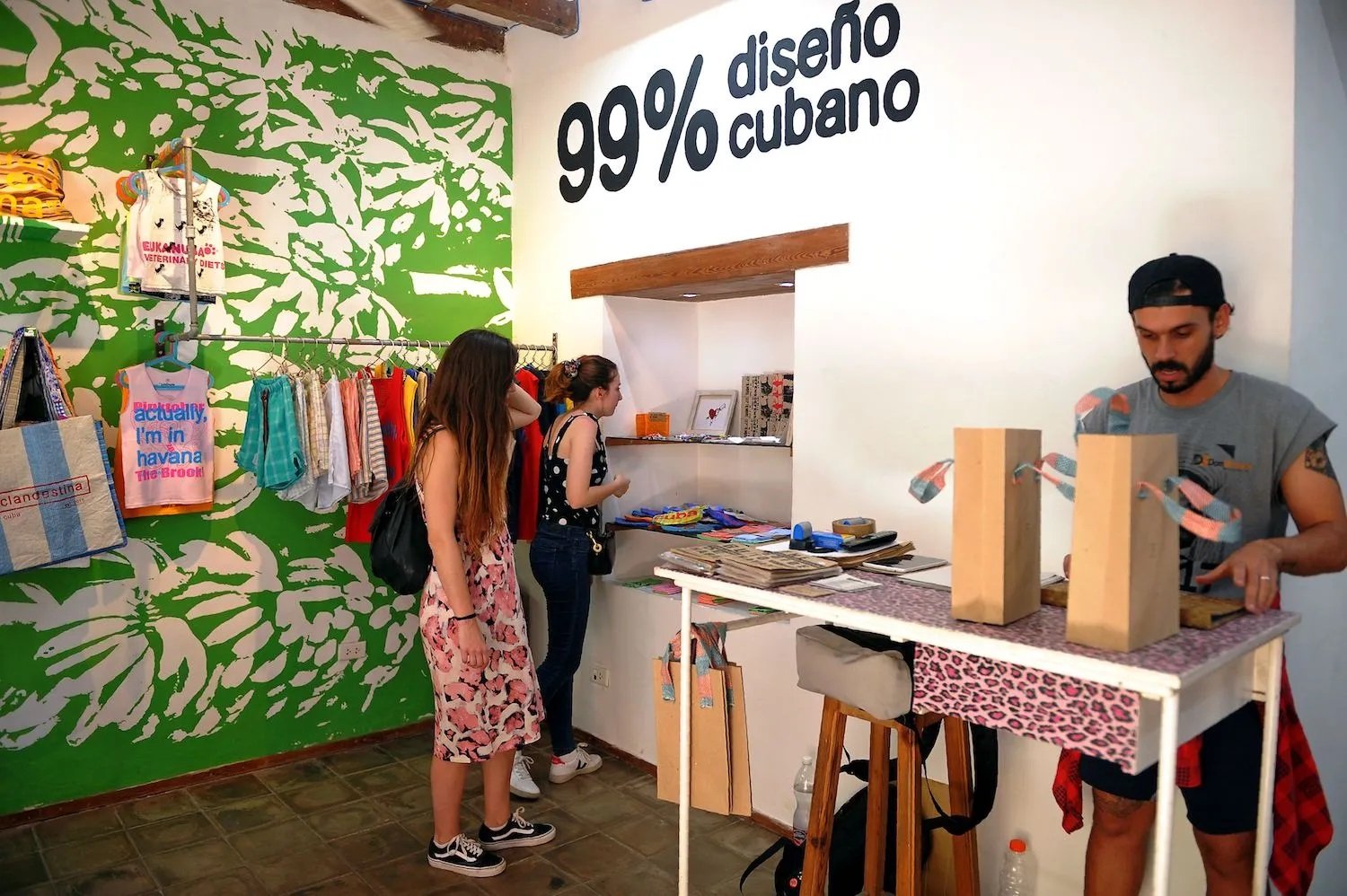Here We Go Again…. Cuba Export-Focused Amendments Media Releases With No Mention Of Support From Exporters/Banks. What If Cuba Defaults? No Focus On What’s Important: Direct Correspondent Banking.
/Here We Go Again…. Cuba Export-Focused Amendments Media Releases With No Mention Of Support From Exporters And Banks. Fails To Focus On What’s Important: Direct Correspondent Banking. What If Cuba Defaults?
Philosophically, Intent Of Amendments Have Support From Exporters, Financial Institutions.
Exporters Do Not Want To Provide Payment Terms And Credit.
Exporters Do Need Direct Correspondent Banking.
And, What Happens To Exporters If Payments From Cuba Not Received Within One Year?
If A Committee Issues Media Releases, Useful To Have Quotes Of Support From Those Impacted Directly- And List Supporting Members From Both Political Parties.
84. “AMENDMENT TO DIVISION D OF RULES COMMITTEE PRINT 117-55 (FINANCIAL SERVICES AND GENERAL GOVERNMENT APPROPRIATIONS DIVISION) OFFERED BY MS. TLAIB OF MICHIGAN. At the end of division D (before the short title), insert the following: SEC. __. None of the funds made available by any title in this Act may be used to implement, administer, or enforce section 908(b) of the Trade Sanctions Reform and Export Enhancement Act of 2000 (22 U.S.C.4 7207(b)).”
137. “An Amendment To Be Offered by Representative Tlaib of Michigan or Her Designee, Debatable for 10 Minutes. At the end of division D (before the short title), insert the following: Sec. ___. None of the funds made available by any title in this Act may be used to implement, administer, or enforce section 908(b) of the Trade Sanctions Reform and Export Enhancement Act of 2000 (22 U.S.C. 7207(b)).”
The Trade Sanctions Reform and Export Enhancement Act (TSREEA) of 2000 e-authorized the direct commercial (on a payment of cash-in-advance basis) export of food products (including branded food products) and agricultural commodities from the United States to the Republic of Cuba, irrespective of purpose. The TSREEA does not include healthcare products, which remain authorized and regulated by the Cuban Democracy Act (CDA) of 1992.
The primary issues with seeking to change payment of cash-in-advance required by the TSREEA are:
The companies that export agricultural commodities and food products from the United States to the Republic of Cuba have never publicly supported the provision of payment terms, credit, or financing.
Financial institutions which would be a source for financing of the export of agricultural commodities and food products from the United States to the Republic of Cuba have never publicly supported the provision of payment terms, credit, or financing.
Neither representatives of exporters nor financial institutions have appeared at hearings held by the United States Congress or issued media releases to confirm they would provide payment terms, credit, and financing if permitted to do so.
Why? Because of the risk of default. Knowing that any default migrating as it would into the public domain would doom the environment for all participants.
What might be the consequences if enactment of Amendments 84 and 137 permitting payment terms, credit, and financing, albeit for one year, and Republic of Cuba-based importers request payment terms, credit, and financing, but United States-based exporters and financial institutions refuse Republic of Cuba-based importers due to the chronic, multi-decade shortage of foreign exchange and history of not making payments as contracted, for defaulting on obligations? To make payments to United States-based exporters, Republic of Cuba-based importers are likely to use funds that should have been used to repay exporters in other countries.
Today, Republic of Cuba-based importers have one choice- make cash-in-advance payment to United States-based exporters as required by the TSREEA or purchase from another source. That makes the choice binary and 100% protective for United States-based exporters.
Cuba's Agricultural Commodity/Food Product Imports From United States Decrease 14.5% In May 2022; Decline Of 7.31% Year-To-Year July 13, 2022
Philosophically, the intention of Amendments 84 and 137 are in line with the views of United States-based exporters and United States-based financial institutions. They both believe they, rather than the United States government, should determine the creditworthiness of their customers. That the risk is for management to accept or reject rather than the United States government unnaturally interfering in the private sector commercial process. An issue with Amendments 84 and 137 is its timing.
With respect to Amendments 84 and 137, if included in legislation that becomes law, the time-frame is for one fiscal year, until 30 September 2023. What happens if an exporter or financial institution provides payment terms and provides financing, and the Republic of Cuba-based importer does not make payment as provided in a contract? What if the payment(s) arrive on 30 October 2023? Has the United States-based exporter and United States-based financial institution violated United States law? Are there criminal penalties? Civil penalties? Does the issue impact the exporter and financial institution with United States government contracts? Might there be shareholder lawsuits?
For the above is why changing the payment of cash-in-advance as required by the TSREEA has not, including in 1999 and 2000 prior to the legislation signed into law by William Clinton, 42nd President of the United States, been supported publicly by exporters and financial institutions.
The preference has been to promote that the Republic of Cuba was the safest export market in the world for United States companies- because payment of cash-in-advance, while limiting export volume and U.S. Dollar value, guaranteed there would be no default by a Republic of Cuba-based importer.
Today, given the chronic shortage of foreign exchange by the government of the Republic of Cuba, inserting risk where none exists is not prudent. United States statutes, regulations, and policies remain a meaningful contributing factor to exacerbating the Republic of Cuba’s global commercial transaction process. However, significant factors also include commercial, economic, and political decisions by the government of the Republic of Cuba which adversely, and continually negatively impact the ability of Republic of Cuba government-operated companies and non-Republic of Cuba government-operated companies with presence in the Republic of Cuba to earn foreign exchange from which to service their respective obligations.
The commercial, economic, and political infrastructure within the Republic of Cuba will continue to evolve and then the question as to whether to support the provision of payment terms, credit, and financing will no longer be a concern.
Meeks, McGovern Urge Support for Financial Services and General Government Amendment #84 Expanding Agricultural Trade with Cuba
19 July 2022: Washington, DC – Representatives Gregory W. Meeks (D-NY), Chairman of the House Foreign Affairs Committee, and Jim McGovern (D-MA), Chairman of the Rules Committee, issued the following statement in support of Amendment #84 to H.R. 8294, which funds the Treasury Department and its Office of Foreign Assets Control (OFAC), that would suspend enforcement of the prohibition on financing of agricultural sales to Cuba. The amendment has previously been included in numerous pieces of legislation, including the Cuba Agricultural Exports Act, which had dozens of Republican cosponsors. It is identical to a bipartisan amendment submitted to the Financial Services and General Government Appropriations bill in 2017: “We strongly support this amendment to end the U.S. government’s prohibition on financing of agricultural sales to Cuba. This common-sense legislation, which has been supported from both sides of the aisle and by agriculture groups nationwide for well over a decade, would create thousands of farm jobs in the United States while providing desperately needed food at lower cost for the Cuban people. Today, Cuba faces its most devastating economic crisis in thirty years, forcing tens of thousands of Cuban people to spend hours in line waiting for food each and every day. In the past six months, we have seen a surge of Cubans fleeing to the U.S.-Mexico border. This amendment would help ease the economic burden by suspending U.S. farm export regulations and extending credit to Cuban food buyers for one year. Farmers across the United States have urged action to permit greater sales from the U.S. for years, and with hunger rising across Cuba, the time is right to enact a temporary suspension that would provide them new opportunities to expand their exports to this market of 11 million people. We are hopeful that both parties can once again come together and support this win-win amendment.”
Meeks, McGovern Urge Support for Financial Services and General Government Amendment #137 Expanding Agricultural Trade with Cuba
19 July 2022 Washington, DC – Representatives Gregory W. Meeks (D-NY), Chairman of the House Foreign Affairs Committee, and Jim McGovern (D-MA), Chairman of the Rules Committee, issued the following statement in support of Amendment #137 to H.R. 8294, which funds the Treasury Department and its Office of Foreign Assets Control (OFAC), that would suspend enforcement of the prohibition on financing of agricultural sales to Cuba. The amendment has previously been included in numerous pieces of legislation, including the Cuba Agricultural Exports Act, which had dozens of Republican cosponsors. It is identical to a bipartisan amendment submitted to the Financial Services and General Government Appropriations bill in 2017: “We strongly support this amendment to end the U.S. government’s prohibition on financing of agricultural sales to Cuba. This common-sense legislation, which has been supported from both sides of the aisle and by agriculture groups nationwide for well over a decade, would create thousands of farm jobs in the United States while providing desperately needed food at lower cost for the Cuban people. “Today, Cuba faces its most devastating economic crisis in thirty years, forcing tens of thousands of Cuban people to spend hours in line waiting for food each and every day. In the past six months, we have seen a surge of Cubans fleeing to the U.S.-Mexico border. This amendment would help ease the economic burden by suspending U.S. farm export regulations and extending credit to Cuban food buyers for one year. “Farmers across the United States have urged action to permit greater sales from the U.S. for years, and with hunger rising across Cuba, the time is right to enact a temporary suspension that would provide them new opportunities to expand their exports to this market of 11 million people. We are hopeful that both parties can once again come together and support this win-win amendment.”
LINKS To Related Posts
Arkansas Senator Boozman Will Re-introduce Legislation To Permit Payment Terms And Financing For U.S. Ag/Food Exports To Cuba. He Should Wait Until There Are Contracts In Place. June 30, 2021
Are Cuba Advocates Again Ahead Of Tips Of Their Legislative/Regulatory Skis? February 27, 2021
Five Essential Elements For Cuba Food/Ag Legislation To Be Successful In The U.S. Congress May 19, 2019
Do U.S. Secretaries Of Agriculture & Treasury Comprehend Value Of Direct Correspondent Banking To Exporters? February 13, 2018
Change To OFAC Banking Regulation Long Overdue; No Rationale For Delay September 26, 2016
US Expected To Authorize Banks In Cuba To Have Correspondent Accounts With US Banks March 04, 2016














































